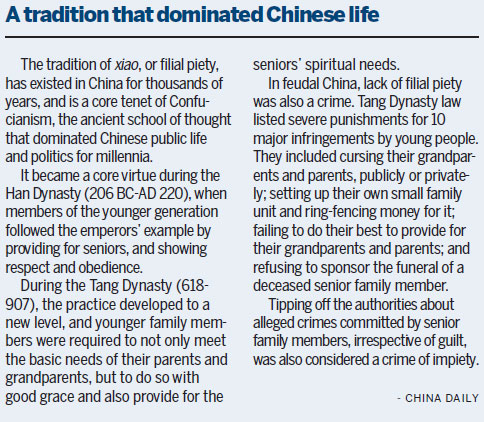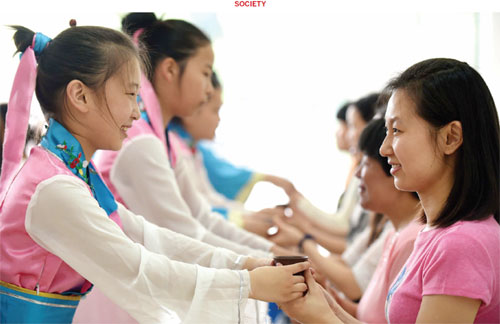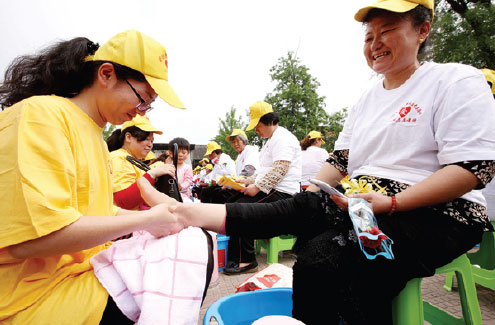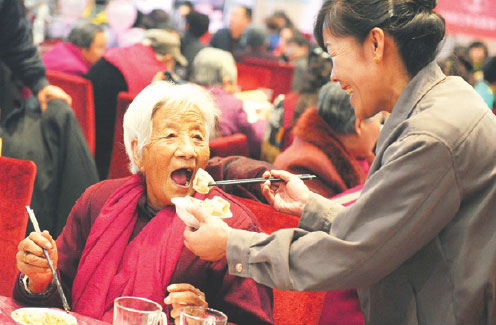A family affair?
Updated: 2015-12-23 07:56
By Xin Dingding(China Daily)
|
||||||||
The concept of filial piety, once a core value in China, is waning rapidly in the wake of the country's growing industrial power. However, heavy-handed attempts to reinstate the practice have sparked headlines and criticism, as Xin Dingding reports.
Lyu Meiye, the owner of a beauty salon in Guangzhou, Guangdong province, has stopped taking calls and has refused all requests for interviews after unguarded comments about her "filial piety tax" sparked headlines in China and across the world.
While being interviewed for a newspaper article about filial piety - a core tenet of Confucianism - in October, Lyu disclosed that every month she deducts 10 percent from the salaries of unmarried employees and 5 percent from those of married staff members and wires the money directly to their parents. The policy is made clear to every potential recruit, she said, and "those who disagree will not be hired".
Lyu was surprised and shocked by the criticism she received in the media and on social-networking platforms, according to a salon employee who preferred not to be named. The salon owner believed her actions were well-intentioned. She intended to remind young people of a practice that once was a key aspect of Chinese society - whereby children were required to show their parents unfailing respect - but has declined as a result of social and cultural changes prompted by the country's development in the past 35 years.
The news that the company compensates employees by providing subsidies of 100 yuan ($15) per month for those in their second year of employment, rising to 300 yuan for workers who have been with the company for three years or longer, failed to dampen the criticism Lyu received.
One of the most serious complaints was related to the legality of the policy. Tang Yi, a lawyer in Shanghai, was quoted in a news report as saying that a person's salary is their personal property, and without the owner's permission, no outsider is allowed to tamper with it, not even an employer. Furthermore, even if Lyu's policy is legal - providing the employee agrees to the practice before starting work - the fact that those who disagree are deemed not worth hiring may also contravene employment law.
The authorities have yet to make a decision, but the furor prompted many people to ask if the influence of filial piety has waned so much that young people need to be compelled to honor their parents.
A Confucian ideal
The concept of filial piety, known as xiao in Chinese, was introduced by the sage Confucius (551-479 BC), whose school of thought dominated Chinese life for thousands of years. Under the concept, when younger family members start work, they are duty-bound to care for their elderly parents by providing funds, either every month or as a lump sum during family reunions at Chinese New Year.
The Classic of Filial Piety, an orthodox Confucian text, consists of a series of conversations between Confucius and Zeng Zi, a disciple, and according to Confucian doctrine, our bodies are gifts from our parents, so children must not attempt to harm them, but should seek to bring them honor.
Although no research has been undertaken to determine the strength of filial piety in modern China, many young people don't consider it to be a duty nowadays.
Lai Jiaming, a waiter in Shenzhen, Guangdong, left his home in the rural area of Heyuan six years ago, but he has never sent money to his parents. He sees nothing wrong with that, though, "because most of my peers are doing the same".
According to the 23-year-old, his first few years away from home were tough. He had no money to give his parents because his jobs were usually short term and he was forced to borrow money to make ends meet. "Once I had earned money in the new job, I had to pay my debts from the old one," he said.
Although he has worked for his current employer for three years, and earned a decent salary, he still doesn't wire money home. "I need to save money for my own future family," he said. "The good thing is that my parents have never put any pressure on me to send money."
Liang Dong, 32, who this year participated in a six-month training program for young migrant workers in Beijing, admitted that he has not sent money to his parents in Liupanshui, Guizhou province, since he left home 15 years ago.
"The cost of living in the rural areas is low. My parents grow food and can feed themselves. They have very few other expenses," he said.
Liang felt that he needed the money more than his parents, because life is more expensive in the city than in his hometown. Moreover, because he failed to finish high school and has no qualifications or work-related training, he is unable to land a high-income job.
Waning influence
In recent years, Liu Yanwu, an associate professor at the sociology department of Wuhan University in Hubei province, has conducted field research in rural areas. He believes the influence of filial piety has become weaker nationwide, and as a result some seniors live miserable lives. Some have even committed suicide.
When Liu stayed with a family in a village in Central China for 15 days, he was given a room in his host's well-maintained brick house, while the host's 85-year-old mother lived in a damp room of less than 10 square meters, next to a malodorous outdoor toilet and a pigpen.
The elderly woman's situation wasn't the worst Liu has encountered, though. In a rural area comprising five adjacent villages, four seniors starved to death "in recent years" because they could not get enough food from their adult child-ren.
In another village in the northern province of Shanxi, a 75-year-old woman drowned herself in a water cellar because her son refused to supply her with food when she asked.
According to Liu's research, published in 2013, the number of suicides among seniors has been rising steadily since 1980, when 60.85 out of every 100,000 rural seniors took their own lives. The number jumped to 192.70 per 100,000 in the 1990s, before soaring to 507.10 in the early years of this century.
Some seniors killed themselves because they were unable to survive on their own, or because their emotional needs could not be met. Others did so as an act of revenge on their children, who would face severe criticism for failing to care for their parents properly.
"I've been to both rich and poor rural areas. After years of economic development, most people should not have a problem providing for their parents and meeting their basic needs. These tragedies should not have happened at all. Yet incidents such as these keep happening, which indicates that the culture of filial piety is definitely waning," Liu said.
Social transformation
Liu believes that while the problem may indicate a lack of humanity or lax moral standards, it is also a reaction to China's ongoing social transformation.
Since the 1980s, when cities first opened their doors to rural laborers, millions of young and middle-aged workers have left their homes to seek a better standard of living, he said.
However, if the migrants want to take care of their parents properly, they have to return to their rural home, which often means a sharp downturn in their own living conditions.
Moreover, the middle-aged - the main focus of filial piety concerns - have children of their own to provide for.
In today's China, that's a big burden because nowadays parents not only have to bring up their children, but also have the added burden of paying for a decent education and for extracurricular activities that give children the chance to develop in other ways.
"So when the family structure changes, some people opt to 'sacrifice' the seniors, who are an even more vulnerable group," he said.
The problem is becoming even more acute because seniors are "losing protection from the traditional clan system and traditional culture", he added.
Yang Hua, a research fellow with the Center for Rural China Governance at Huazhong University of Science and Technology in Wuhan, said that in the past, villages were almost completely isolated from the outside world, so relations between villagers were forged by blood or close geographic proximity.
Now, the old traditions are dying out in the rural areas as a result of greater contact with the outside world, the labor outflow and the growing influence of the market economy.
"It's becoming more common that people just take care of their own business," Yang said.
Wuhan University's Liu said that in this new cultural climate, young family members probably don't even realize that they are being "impious", even if they fail to treat their parents with the respect accorded to previous generations.
Similar stances
The problem is attracting growing public attention. Many employers are adopting a similar stance to Lyu's beauty salon with the aim of encouraging greater filial piety among employees, except the money that is wired to employees' parents is not deducted from staff salaries.
Lai Jiaming, the waiter in Shenzhen, said that since 2012 his boss has wired money to the parents of employees who have worked at the restaurant for more than a year. Unlike Lyu's salon, though, the money is donated by the owner, so staff wages are not affected.
Since the end of 2013, the Hengshui Runlu Food Co, in Hengshui, Hebei province, has wired money to the parents of all employees who have worked for the company for two years. According to sales manager Xie Mingxing, the chairman of the board believes people who don't value filial piety should not be employed by the company.
Liu, the sociologist, said that as long as money isn't deducted from employees' salaries, companies should be encouraged to contribute if they choose to do so.
In addition to promoting the practice, the policy gives employees a sense of belonging, while their parents will be more likely to approve of their children working for such socially conscious companies, he added.
However, the government needs to echo the good examples set by businesses, and should shoulder the primary responsibility of promoting and reinstating filial piety to make it a core value of modern China, according to Liu.
"It is crucial if rural China is to develop properly," he said.
Xu Jingxi in Guangzhou contributed to this story.
Contact the writer at xindingding@chinadaily.com.cn

|
Primary school students dressed in traditional costume serve tea to their mothers before Mother's Day in Hefei, Anhui province. Xie Chen / for China Daily |
|
A woman washes her mother's feet at an annual event promoting filial piety in Mengcheng, Anhui. Hu Weiguo / for China Daily |
|
Volunteers celebrate in preparation for the winter solstice with 1,000 senior citizens in Lanzhou, Gansu province, on Monday. Xue Chaohua / China Daily |
(China Daily 12/23/2015 page6)

 Whatever the shape or size of a tree, Merry Christmas!
Whatever the shape or size of a tree, Merry Christmas!
 The world in photos: Dec 14 - 20
The world in photos: Dec 14 - 20
 First American woman who works as captain for a Chinese airline
First American woman who works as captain for a Chinese airline
 Life of a family amid Beijing's red alert smog
Life of a family amid Beijing's red alert smog
 External coffin lid of 2,000-year-old Chinese tomb opened
External coffin lid of 2,000-year-old Chinese tomb opened
 First Miss Iraq named in decades
First Miss Iraq named in decades
 Iraq holds its first beauty contest in 40 years
Iraq holds its first beauty contest in 40 years
 Highlights at the Light of the Internet Expo
Highlights at the Light of the Internet Expo
Most Viewed
Editor's Picks

|

|

|

|

|

|
Today's Top News
Shooting rampage at US social services agency leaves 14 dead
Chinese bargain hunters are changing the retail game
Chinese president arrives in Turkey for G20 summit
Islamic State claims responsibility for Paris attacks
Obama, Netanyahu at White House seek to mend US-Israel ties
China, not Canada, is top US trade partner
Tu first Chinese to win Nobel Prize in Medicine
Huntsman says Sino-US relationship needs common goals
US Weekly

|

|










